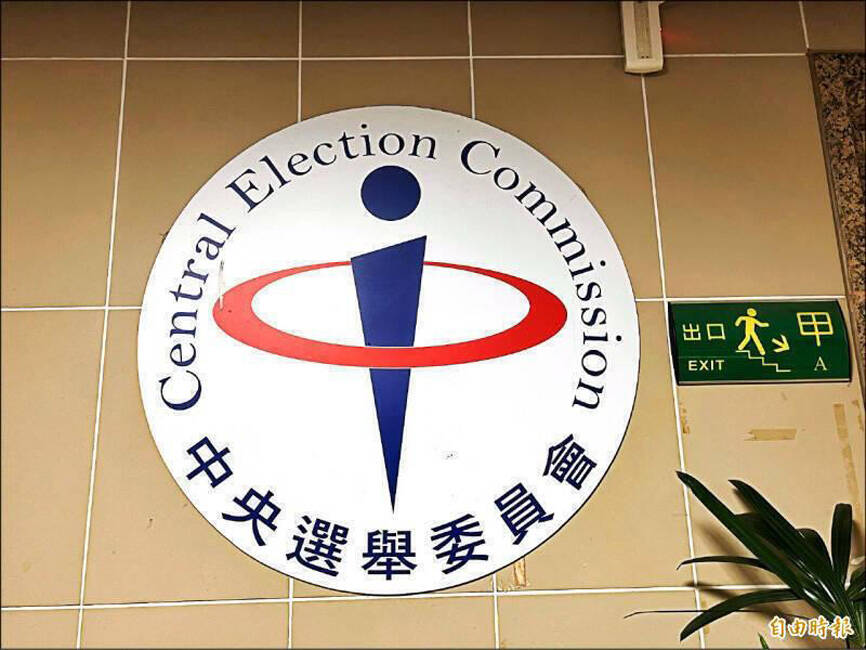Whether two referendum proposals submitted by the Chinese Nationalist Party (KMT) align with legal definitions in the Referendum Act (公民投票法) needs to be discussed from a broader perspective, the Central Election Commission (CEC) said on Friday.
The issue needs “collective consideration and review from multiple perspectives” in society, it said in a statement.
On Tuesday, the Legislature passed a motion advancing the KMT’s proposals to a second reading without committee review.

Photo: Taipei Times file photo
The proposed referendums are aimed at asking voters their views on capital punishment, which is legal in Taiwan, although rarely enforced; and on “martial law,” which evokes the 38-year period of authoritarian KMT rule prior to Taiwan’s democratization beginning in the late 1980s.
The referendum proposal framed as “opposing the abolition of the death penalty” would ask voters: “Do you agree that judges in a collegiate panel at all levels of courts do not need unanimous agreement to sentence a defendant to the death penalty?”
The referendum proposal “opposing martial law” would ask: “Do you agree the government should avoid war and prevent Taiwan from becoming a place of martial law, where youth die and homes are destroyed, as in Ukraine?”
The KMT’s move to put the two issues to a public vote would be the first time a referendum is initiated by the legislature rather than by political parties or civic groups.
Such proposals are limited to initiatives or referendums on major policies, according to the Referendum Act, while proposals submitted by political parties and civic groups can also include initiatives on legislative principles and referendums on laws.
CEC Chairman Lee Chin-yung (李進勇) on March 21 said the opposition party’s proposed referendum questions “would have no effect even if passed,” because asking the government not to implement a policy that does not currently exist is illogical.
The act stipulates that referendum proposals must pertain to significant policy changes, either by introducing new policies or reversing existing ones, Lee said.
“The CEC hopes that the first referendum proposal submitted by the legislature will proceed in full compliance with the law,” he said, adding that the issue “requires collective consideration and review from multiple perspectives.”
It was not clear if Lee had seen the actual questions proposed at the time, as the question proposed on the death penalty is not consistent with its public framing.
On Friday, Democratic Progressive Party lawmakers occupied the podium at the legislature in an attempt to block the confirmation of the meeting minutes from Tuesday.
However, their action was in vain, as Legislative Speaker Han Kuo-yu (韓國瑜) did not show up to announce the start of the session, meaning that it did not take place.

The Ministry of Economic Affairs has fined Taobao NT$1.2 million (US$36,912) for advertisements that exceed its approved business scope, requiring the Chinese e-commerce platform to make corrections in the first half of this year or its license may be revoked. Lawmakers have called for stricter enforcement of Chinese e-commerce platforms and measures to prevent China from laundering its goods through Taiwan in response to US President Donald Trump’s heavy tariffs on China. The Legislative Yuan’s Finance Committee met today to discuss policies to prevent China from dumping goods in Taiwan, inviting government agencies to report. Democratic Progressive Party Legislator Kuo Kuo-wen (郭國文) said

The Ministry of Economic Affairs has fined Taobao NT$1.2 million (US$36,900) for advertisements that exceeded its approved business scope and ordered the Chinese e-commerce platform to make corrections in the first half of this year or its license would be revoked. Lawmakers have called for stricter supervision of Chinese e-commerce platforms and more stringent measures to prevent China from laundering its goods through Taiwan as US President Donald Trump’s administration cracks down on origin laundering. The legislature’s Finance Committee yesterday met to discuss policies to prevent China from dumping goods in Taiwan, inviting government agencies to report on the matter. Democratic Progressive Party

Taiwan and its Pacific ally Tuvalu on Tuesday signed two accords aimed at facilitating bilateral cooperation on labor affairs, according to Taiwan’s Ministry of Foreign Affairs (MOFA). The governments inked two agreements in Taipei, witnessed by Foreign Minister Lin Chia-lung (林佳龍) and visiting Deputy Tuvaluan Prime Minister Panapasi Nelesone, MOFA said in a news release. According to MOFA, the agreements will facilitate cooperation on labor issues and allow the two sides to mutually recognize seafarers’ certificates and related training. Taiwan would also continue to collaborate with Tuvalu across various fields to promote economic prosperity as well as the well-being of their

Sung Chien-liang (宋建樑), who led efforts to recall Democratic Progressive Party (DPP) Legislator Lee Kun-cheng (李坤城), was released on bail of NT$80,000 today amid outcry over his decision to wear a Nazi armband to questioning the night before. Sung arrived at the New Taipei District Prosecutors’ Office for questioning in a recall petition forgery case last night wearing a red armband bearing a swastika, carrying a copy of Adolf Hitler’s Mein Kampf and giving a Nazi salute. Sung left the building at 1:15am without the armband and covering the book with his coat. Lee said today that this is a serious